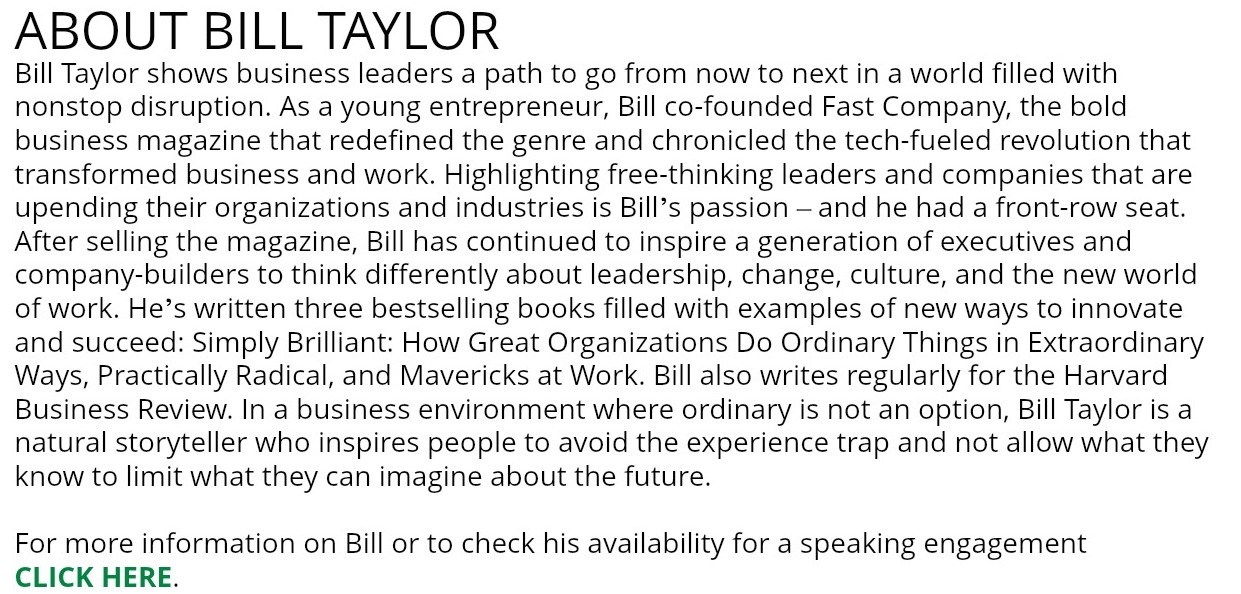Why Sports are a Terrible Metaphor for Business - Bill Taylor | Top Business Speaker
BILL TAYLOR is the co-founder of Fast Company and the author, most recently, of Simply Brilliant: How Great Organizations Do Ordinary Things in Extraordinary Ways. To access a free chapter of Simply Brilliant, please click here.
Bill is also a top business speaker managed by the D'Amelio Network. Tony D'Amelio asked Bill to update his popular essay on this topic which originally appeared online in Harvard Business Review. We hope you enjoy it.
-----------------------------------------------------------
What's wrong with making analogies between sports and business?
Here in the United States, and truth be told, in most place around the world, we are crazy about sports, especially team sports…The Super Bowl…The NCAA Final Four…The World Cup. But the buzz around sports, at least among business executives who are fans of the competitors on the field as well as competitors themselves in their own industries, is often about more than just the game. Does the consistent excellence of a football team like the New England Patriots offer insights on teamwork that transcend the gridiron? Does the game-changing impact of basketball superstars such as LeBron James offer lessons about the value of high-powered talent on Wall Street or Silicon Valley?Even as high-minded a publication as The Economist gets caught up, every so often, in the connection between sports and business. A few years back, writing about a team that was dominating the world’s most popular sport, the magazine claimed that FC Barcelona, the renowned Spanish soccer club, “has provided a distinctive solution to some of the most contentious problems in management theory.” Wow!
So the question becomes: What can sports really teach us about competition and success, talent and teamwork, value and values? My answer, I’m afraid, is not very much. Sports, it turns out, is a terrible metaphor for business, and leaders who look to the gridiron or the soccer pitch for ideas about their work may be sorely disappointed.
Here’s what’s wrong about making analogies between sports and business.
The logic of competition and success in sports and business are completely different
What makes football or basketball so exhilarating is that at the end of a season, only one team wins. In the case of the Super Bowl, for example, there is a world champion, and 31 other NFL teams with crushed dreams and dispirited fans. For one team to win, every other team must lose. The logic of business competition is nothing like this. The most successful companies, those that win big and create the most economic value, worry less about crushing the competition than about delighting and amazing their customers. Indeed, the very idea of zero-sum competition (for me to win, you must lose) feels like a relic from a long-ago era in business. Virtually every industry has room for plenty of different winners, each of whom is great at serving a distinctive piece of the market or a certain set of customers.
Read Chapter one of Simply Brilliant by Bill Taylor,
co-founder of Fast Company magazine
A few years ago, during the research for our book Mavericks at Work, Polly LaBarre and I spent time with Mike McCue, one of the great entrepreneurs in Silicon Valley. Here’s how he explained his approach to strategy and success: “Even in the face of massive competition, don’t think about the competition. Literally don’t think about them. Every time you’re in a meeting and you’re tempted to talk about a competitor, replace that thought with one about user feedbacks or surveys. Just think about the customer.”
The dynamics of talent and teamwork in sports and business are completely different
You’d think business organizations would have lots to learn from high-performing sports teams, but there are huge weaknesses in the comparisons that make the analogy virtually useless. Most importantly, “teamwork” in most professional sports means teamwork among players whose careers are absurdly short, and whose loyalties to any one team only last for as long as the duration of their contract. According to the Wall Street Journal, for example, the average length of an NFL career is just 2.66 years, down from 5 years back in 2008. So the job of an NFL coach is to cajole, push, and otherwise squeeze maximum effort from players who have almost no expectation of sticking around for very long.
What sane company would take that approach? Organizations that are building for the long term, that hope to attract, grow, and retain the best people in their fields, and to create an environment where great people do their best work year after year, have little to learn from the short-term, utterly disposable mentality that defines life in professional sports. One bad game, one disappointing season, can mean the end of a career for a gifted and determined member athlete. That’s not how great organizations work in business.
SUPPLEMENTAL READING:
Bill Taylor Q&A: On Leading Innovation and Being Simply Brilliant,
Bill Taylor: 50 Reasons Why We Can’t Change
The creation of economic value in sports and business are completely different
Even the most ardent sports fans are quick to agree with the idea that sports is a business. And the business of sports, it turns out, may offer even fewer lessons for business leaders than what happens on the field. Consider the NFL. Unlike most billion-dollar businesses, which are owned by shareholders and governed by a board of directors, nearly every NFL team is owned by a single individual, usually a billionaire, and they are accountable to virtually no one besides the other billionaire owners. The one notable exception is the Green Bay Packers, which are structured as a nonprofit organization and are run to benefit the community.
NFL owners have reaped vast riches over the last 20 years, negotiating huge television contracts, demanding big subsidies from taxpayers, and devising new ways to profit from the internet. Their hardball tactics have made them very wealthy — but very unpopular with fans. Remember that old expression “Don’t hate the player, hate the game”? Well, NFL fans (and fans of most sports, truth be told) love the players, but hate the owners.
And don’t even get fans started on NFL commissioner Roger Goodell, who may be the single most unpopular executive in all of sports. It’s hard to square the unprecedented popularity of football with the universal unpopularity of NFL owners, but that’s the business of sports — and another reason why sports are a lousy metaphor for business. It’s hard to learn many leadership lessons from an industry whose leaders are burned in effigy or booed at huge public gatherings.
So I hope everyone has a great time rooting for their favorite football, college hoops, or baseball team. (As a lifelong New Englander, my mood rises and falls with the outcome of every Boston Red Sox game.) But the idea that what happens on the field (or in the teams’ executive offices) teaches us much of anything about what should happen inside our organization is misguided. It’s fun to be a “student of the game,” but let’s not kid ourselves that any lessons we learn apply to our roles as company builders or business leaders.
About Bill Taylor
In addition to writing, Bill’s passion is speaking - bringing audiences groundbreaking new ideas and techniques to compete, innovate, and succeed. He’s also authored three bestselling books on leadership, culture, and change. His latest, Simply Brilliant: How Great Organizations Do Ordinary Things in Extraordinary Ways, was named “Best Strategy & Leadership Book of 2016” by 800CEORead. His previous books include Practically Radical and Mavericks at Work. Bill created the “Under New Management” column for The New York Times and has published numerous essays and CEO interviews in the Harvard Business Review, where he now blogs regularly.

.png)

.jpg)



